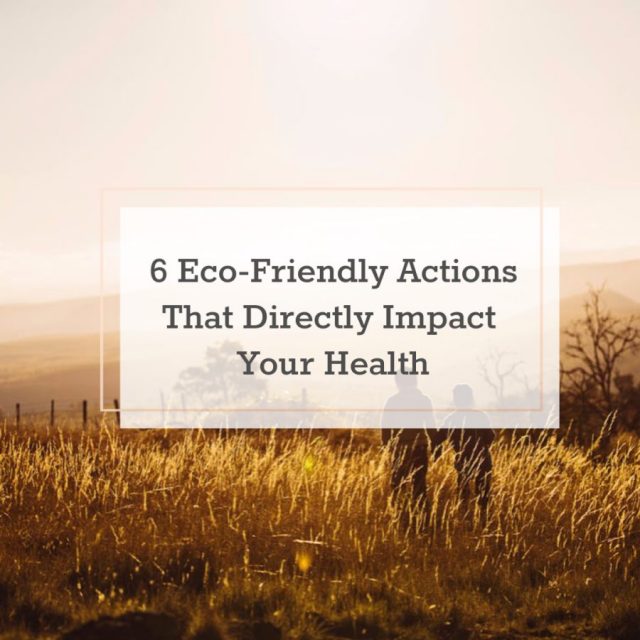How to Have a Healthy Beach Day

There’s no denying it – our beautiful planet is in trouble.
On top of the much-discussed climate change, planet Earth is threatened by air pollution, scarcity of water, deforestation and animal extinction on a large scale.
And the environmental changes are affecting your health – through the quality of the air you breathe, the water you drink, the soil that grows your fruit, vegetables and grains.
Now I’m not a no-waste eco warrior who only eats organic produce from the veggie patch. Just like many of you, I have a limited amount of energy and resources to get everything done. But recently I have started taking tiny steps into a more environmentally-friendly direction. Because it matters – not just to the earth and its future residents, but to my family’s health today.
Let’s have a look at why being a green god(dess) is good for your health and which eco-friendly actions you can start taking today to make a positive impact.
This blog post may contain affiliate links, at no extra cost to you. All opinions are my own.
You may not be aware of it, but cleaning and beauty products contain small amounts of toxins and chemicals. Not only do these toxins put a burden on your body, they also affect the (indoor) environment.
For example, scented candles and air fresheners hold phthalates, chemicals that increase your risk for asthma and endocrine problems. Phosphates from laundry and dishwasher detergent even find their way into rivers and lakes, harming aquatic life.
I don’t want to sound like those doomsday articles saying your deodorant or food staples are slowly killing you. There’s only so much about your surroundings that you can control, and getting stressed over potential health hazards won’t do your wellbeing no good either. But here are some things you can do to reduce your exposure to everyday toxins:
I don’t follow nor do I advocate a vegetarian or vegan diet. But eating less animal protein proves to be good for your body – and the planet.
According to Babette Porcelijn, author from Hidden Impact, consuming (red) meat has the second largest impact of our daily lives on the environment. It takes 15,000 liters of water to produce 1 kilogram of beef – the equivalent of 300 days of showering. When you also counter in the negative effects of the use of fertilizers, deforestation and greenhouse gas, eating beef makes up 30% of the impact caused by individuals.
Cutting back on meat, even if it’s just once a week, has numerous benefits for the environment and your health. By consuming less unhealthy fats, salts and preservatives from (red and/or processed) meat, you lower your risk of heart disease and cancer. Have a look at how you can start consuming less animal protein:

We all know that flying and driving are bad for the environment. The car exhaust fumes and particle emissions pollute the air, leading to an increased risk of lung disease and heart attacks. Not to mention that the earth is running out of fossil fuels.
Walking or cycling to school, work and the shops isn’t just a green way to get places. It builds your aerobic fitness levels, tones your legs and most of all, it’s fun! Even on cold and wet days when I really don’t feel like jumping on my bike, I feel invigorated and mentally refreshened afterwards.
Here are some ideas to fit walking and cycling into your daily schedule:
If muscle-powered transport isn’t an option due to your health, safety reasons or travel distances, you could also consider eco-friendly solutions like taking public transport. Research shows that people who take the bus, train or tram walk 8 to 33 minutes more each day than car drivers do.
Don’t you just feel mentally and physically recharged after a hike in the woods or a stroll in the park? Your intuitive feeling that being in nature is good for you is backed by science. Spending time in natural surroundings lowers your blood pressure, calms your nervous system, eases brain fatigue and reduces symptoms of stress, depression and anxiety. In fact, green spaces are so powerful for our wellbeing, that even just looking at pictures of natural landscapes helps lower anxiety and pain levels in hospital patients.
Trees and plants play a vital role in supporting life across the planet, by producing oxygen and absorbing carbon dioxide. But as a result of large-scale agriculture, forests half the size of England are cut down each year. This deforestation destroys the homes of wildlife and drives climate change.
And it’s not just the quality of outdoor air you should worry about. Studies from NASA have shown that indoor air is usually far more polluted than outdoor air. Another good reason to surround yourself with more green!
Try these eco-friendly actions to make your personal living environment a little greener:
It’s a tragic sight: the plastic soup in our oceans. According to The Independent, there are 500 times more micro-plastic particles in the sea than there are stars in our galaxy. The remaining plastic waste ends up in landfills, where it could take up to 500 years to decompose, and potentially leak pollutants into the soil.
That’s why in 2017, the United Nations declared a war on ocean plastic. Here’s what you can do to help:

It might sound like a bit of a stretch to connect your digital life to the environment. But the manufacturing of computers and cell phones put a heavy burden on our natural resources. According to Hidden Impact, the mining of raw materials like cobalt, graphite and tin contributes greatly to the pollution of the Earth. What’s more, electronic devices use up precious energy in our always-connected world.
And as much as I love the Internet, modern technologies also have a significant impact on our physical and mental health. We’re facing an unhealthy increase of inactivity and obesity, mood disorders, strained eyes and shorter attention spans – and our love for our smart phone is partly to blame.
I’m not saying that paper is necessarily better for the environment, but occasionally unplugging is good for your wellbeing in many ways.
“The greatest threat to our planet is the belief that someone else will save it.” – Robert Swan
Are you a green god(dess) by nature or are you just starting out with a more green lifestyle? Which eco-friendly actions will you be taking for a healthier body and environment?